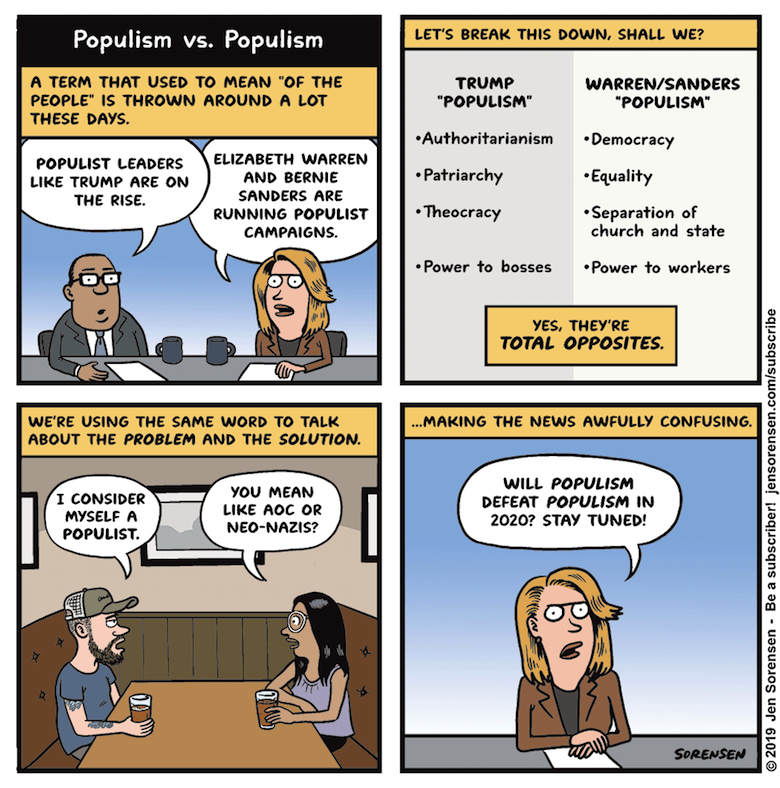The word populism has been in much use recently with many articles describing the rise of populist political parties and leaders around the globe. Cartoonist Jen Sorensen makes the point that the word ‘populism’ has become used to describe wildly different political stances.


Mano, have you seen the films A Face in the Crowd and All the King’s Men? They capture quite nicely, I think, the phenomenon of the dark side of populism in the US.
Rob,
I have seen All the King’s Men and read the book. I believe the story was based on Huey Long, a Louisiana politician.
I have not seen A Face in the Crowd. I’ll see if I can get hold of it. Thanks!
Thanks for that cartoon. I’ve been thinking it’s just my ignorance, not understanding why “populist” never seems to mean what I think it ought to mean. To me, it should be a positive descriptor that denotes government in service of people rather than corporations, but even historically it seems like it’s used as a negative to describe conservative, religious, rural people vs liberal, progressive city people. And even though I grew up in a rural area, when they taught us about Bryan and the Populist Party they made it sound bad or foolish (because he lost? Surely not because of Scopes). Which may be where a lot of my confusion comes from…
If other people aren’t sure what it means either, maybe it’s time to retire the term. I’m not sure it can be rehabilitated at this point.
ridana,
I think the term ‘populist’ does not refer to any particular ideology or political stance. It merely means that it is supposed to reflect the will of a significant number of people. But different groups of people could have different desires, even polar opposite ones.
ridana and Mano, I will observe that we don’t hear Bernie Sanders, Elizabeth Warren, or AOC use the term “populist” to describe themselves or their movements. So, while others choose to use this term this year, they themselves are not choosing to do so.
This might be viewed in the shadow of Bernie choosing to describe himself as a Democratic Socialist, even though some political experts would label him more as a social democrat. I think the phrase “democratic socialist” is only useful in contrast with the description of most Republicans as being “corporate socialists” in practice, although they are never tempted to identify themselves that way.
While a historical reference to usage in the USA from the 1880s to the 1920s could be useful, it is not widely enough known to be really clarifying. Also, the economic desires of people in those decades were somewhat incoherent, due to the then-current economic theories being only pre-Kensian. Of course, few are familiar with the details of modern monetary theory, so citing MMT references would have little value without an explanation. I think the key thing is to look for what specific policies are being promoted by each candidate or group, and go with the policies that seem most appropriate.
As generally used, “populism” is a rhetorical style, not a set of policies. Per wikipedia:
It’s important to note that the defining feature of this definition is the claim to represent “the people” versus “the elite” -- a claim which need not actually be true in order for a movement to be considered populist.
Jim Hightower, a longtime progressive activist with a strong fondness for (most of) the 19th-century Populists, has recently begun describing his part of the movement as “democratic populism” -- a sensible clarification certain to be disregarded by corporate media.
Or worse yet, one the “conservatives” (actually the major force for change in our politics these days, albeit negative change) will weaponize -- as they did “secular humanism” -- to mean “the enemy”, as part of their endless hostility to the Democratic Party and democracy in general.
Totally OT
Hi Mano,
I imagine you have already seen this but just in case https://www.colombotelegraph.com/index.php/us-sl-draft-sofa-reveals-american-plan-to-turn-sl-into-military-colony-but-mangala-says-no-danger/
Dunc@6,
The Grauniad has been touting some research along these lines recently. I’m far from convinced that the term has an y useful content, as it is applied both to politicians who target real elites (the very rich, big corporations, press barons, etc.), and those who invent fake ones (the “deep state”, “liberal elite”, “activist judges” etc.) in the service of the real ones. It strikes me as a form of “bothsiderism”.
KG: I think it’s valid as a classification of a style of rhetoric. You can usefully identify commonalities in how people present their positions without any reference to the specific content of those positions. Just as a false syllogism is still a syllogism, fake populism is still populism.
Dunc@10,
Possibly. But I’d need to be convinced that the styles of rhetoric are genuinely similar, and it’s not clear to me whether the researchers were actually objective, or invented their criteria to give the result they wanted.